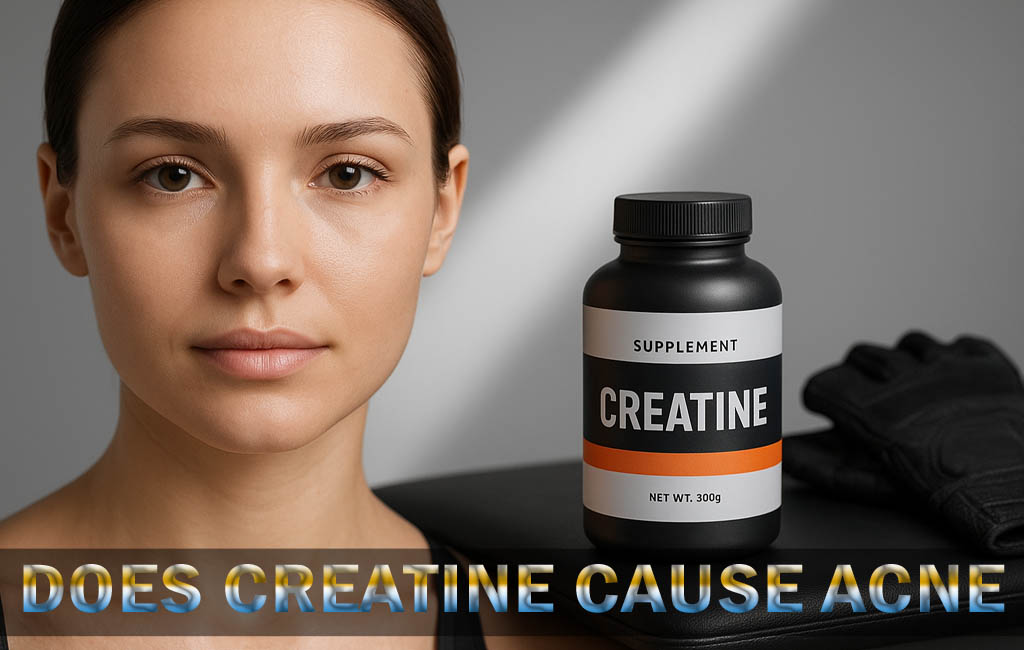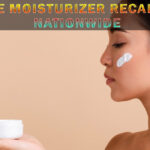What Is Creatine?
Creatine is a naturally occurring compound found in small amounts in foods like red meat and fish, and it is also produced by the human body. It plays a crucial role in energy production, particularly during short bursts of high-intensity activity such as weightlifting or sprinting. When stored in the muscles as phosphocreatine, it helps regenerate ATP—the body’s main energy source—allowing individuals to train harder and recover faster.
Because of these benefits, creatine supplements have become a cornerstone of sports nutrition. The most common and well-studied form is creatine monohydrate, known for its safety, effectiveness, and affordability.
Why People Worry About Creatine and Acne
The rumor that creatine causes acne usually stems from its perceived link with hormones. Some believe creatine raises testosterone levels, which may increase sebum (oil) production in the skin, leading to clogged pores and breakouts. Others associate acne with the lifestyle changes that often accompany creatine supplementation, such as more intense workouts, higher protein intake, or less focus on hydration and skincare routines.
To address these concerns, we need to look at two things: what causes acne in the first place, and how creatine interacts with the body.
Understanding Acne
Acne is one of the most common skin conditions worldwide. It occurs when hair follicles become clogged with oil, dead skin cells, and bacteria. The main factors contributing to acne include:
- Excess oil (sebum) production: Hormonal changes can stimulate oil glands, creating an environment for clogged pores.
- Hormones: Androgens like testosterone can trigger acne, especially during puberty or hormonal fluctuations.
- Bacteria: Propionibacterium acnes, a bacteria present on the skin, can contribute to inflammation and pimples.
- Lifestyle: Stress, diet, poor sleep, and lack of skincare can make acne worse.
Given these causes, it’s worth exploring whether creatine directly influences any of them.
Does Creatine Cause Acne? The Evidence
To date, there is no scientific evidence proving that creatine directly causes acne. Clinical studies on creatine consistently highlight its benefits for performance and health, but none list acne as a side effect. Unlike anabolic steroids, which can significantly raise testosterone and lead to skin issues, creatine does not appear to alter hormone levels in a way that would trigger acne outbreaks.
In fact, most users who experience breakouts may be dealing with other factors indirectly related to creatine use rather than creatine itself.
Creatine and Hormones: Separating Fact From Fiction
The biggest myth about creatine and acne is its supposed effect on testosterone. Research has shown that creatine supplementation does not significantly increase testosterone in healthy men. At most, creatine might cause a very slight increase in DHT (dihydrotestosterone), a hormone derived from testosterone, but studies are inconsistent on this effect and the change is not enough to be clinically significant.
Even if DHT were slightly elevated, that alone would not guarantee acne. Acne is a multifactorial condition influenced by genetics, skincare habits, diet, and environmental triggers. So while hormones do play a role in acne development, creatine is unlikely to be a major factor in changing hormone levels to the extent that it causes breakouts.
Indirect Factors Linking Creatine to Acne
If creatine doesn’t directly cause acne, why do some people notice skin problems when they start taking it? The answer often lies in indirect factors, such as:
- Intense workouts: Creatine enables longer, harder training sessions. With more exercise comes more sweating, which can clog pores if sweat and bacteria aren’t properly cleansed from the skin.
- Dietary changes: Many people who take creatine also increase protein intake or change their diet to support muscle growth. Some high-protein foods and dairy have been linked to acne flare-ups in susceptible individuals.
- Hydration: Creatine pulls water into the muscles, and if hydration isn’t maintained, the skin may become imbalanced, potentially contributing to irritation.
- Stress and lifestyle: More rigorous training routines can also increase stress levels, which are known to aggravate acne.
Who Is More Prone to Acne While Taking Creatine?
While creatine itself is not an acne-causing agent, some individuals may notice more skin breakouts when supplementing, especially if they already have:
- Oily or acne-prone skin.
- Genetic predisposition to acne.
- Hormonal imbalances (such as teenagers or young adults).
- Dietary habits high in dairy or processed foods.
In these cases, creatine might indirectly appear to “cause” acne because of lifestyle overlaps, but it is not the true underlying trigger.
How to Use Creatine Without Worsening Acne
If someone is worried about acne while using creatine, the good news is that simple skincare and lifestyle strategies can help minimize breakouts:
- Stay hydrated: Drink plenty of water daily to keep both muscles and skin balanced.
- Cleanse after workouts: Wash sweat, dirt, and bacteria from the skin after training sessions to prevent clogged pores.
- Follow a skincare routine: Use non-comedogenic cleansers, moisturizers, and exfoliants suitable for acne-prone skin.
- Monitor diet: Keep track of foods that may trigger acne and adjust accordingly.
- Don’t overdo supplements: Stick to recommended doses of creatine (3–5g per day for maintenance).
Alternatives to Creatine for Fitness Enthusiasts
For those who remain concerned about acne, there are other supplements that may help improve performance without the perceived skin issues:
- Beta-alanine: Enhances endurance and reduces fatigue.
- Branched-chain amino acids (BCAAs): Support muscle recovery and repair.
- Caffeine: Improves focus and workout intensity.
- Protein supplements: Aid muscle growth, though some forms like whey may aggravate acne for sensitive individuals.
While none of these supplements perfectly replace creatine’s unique benefits, they can complement a fitness routine based on personal preferences and skin health concerns.
Scientific Consensus: Creatine and Acne
Most researchers and health professionals agree that creatine is safe and effective, with no proven link to acne. It remains one of the most studied supplements in sports science, and its benefits are consistently validated in areas like strength, recovery, and cognitive health. Acne, being such a common condition, is more likely coincidental or related to other lifestyle habits rather than creatine itself.
Conclusion
So, does creatine cause acne? The evidence says no. Creatine does not directly trigger acne or significantly alter hormone levels linked to breakouts. What some individuals experience may be the result of increased training intensity, sweat, dietary shifts, or pre-existing skin conditions rather than the supplement itself. For most people, creatine is a safe, effective tool for improving fitness goals without compromising skin health.
The bottom line: if acne develops while taking creatine, it’s worth examining lifestyle factors like diet, hydration, and skincare rather than blaming the supplement. With the right balance, individuals can enjoy the full benefits of creatine without worrying about unwanted skin issues.
Frequently Asked Questions about does creatine cause acne
Does creatine cause acne directly?
No, creatine does not directly cause acne. Studies show it does not alter hormone levels significantly enough to trigger breakouts. Most cases are due to other lifestyle factors.
Why do people think creatine causes acne?
Many believe creatine causes acne because of its link to testosterone and DHT. However, research does not confirm this. Breakouts are usually linked to sweat, diet, or genetics.
Does creatine cause acne by increasing testosterone?
Scientific evidence shows creatine does not raise testosterone to levels that would cause acne. At most, it may slightly influence DHT, but this is not a proven cause of breakouts.
Can intense workouts make it seem like creatine causes acne?
Yes. People often ask, “does creatine cause acne after workouts?” The reality is that sweat, clogged pores, and lack of proper skincare during intense training sessions are more likely responsible.
Does creatine cause acne for everyone who takes it?
No, creatine does not cause acne for everyone. Many users take creatine for years without any skin issues. Breakouts are usually individual and depend on skin type, diet, and hygiene.
Does creatine cause acne in teenagers more than adults?
Teenagers may notice more acne while using creatine, but that’s usually because hormones are already fluctuating during puberty. Creatine itself does not directly cause acne in teens.
Does creatine cause acne if hydration is ignored?
Poor hydration can worsen skin conditions. Some ask, “does creatine cause acne when I don’t drink enough water?” The truth is, dehydration can affect skin health, making acne appear worse.
Does creatine cause acne compared to other supplements?
Compared to whey protein or anabolic steroids, creatine is much less likely to be associated with acne. Research confirms creatine is one of the safest supplements with no direct acne link.
Does creatine cause acne through diet changes?
Many users increase protein and calorie intake when starting creatine. This diet shift—not creatine itself—can sometimes lead to breakouts, making people assume creatine causes acne.
What should I do if I think creatine causes acne?
If you suspect creatine causes acne, first review hydration, skincare, and diet. Most cases clear with better skincare routines. If problems persist, consult a dermatologist to confirm the true cause.
Visit Our Official Websitse: Onlinehealthnotes



